CARE
CARE: Creating Access to Resources and Empowerment
AWARE’s CARE services provide support to individual women facing gender-based discrimination, violence, harrassment, sexual assault and a range of other issues. We work closely with external partners in the social development sector in Singapore, and advocate for gender- and trauma-informed practices among key stakeholders. AWARE’s CARE team comprises the Women’s Care Centre (WCC) and the Sexual Assault Care Centre (SACC).
CARE is committed to nurturing a spirit of volunteerism and community participation in Singapore. In 2020—a year when productive social engagement became more complicated than ever—we were able to engage a cadre of 89 dedicated volunteers (including helpliners, lawyers and counsellors) and provide a total of 9,565.9 hours of support to women in need in Singapore. This is collectively equivalent to approximately 1,196 days of meaningful community work, all undertaken by CARE volunteers in 2020.
Below are some other ways in which CARE adapted and responded to the challenges brought about by the COVID-19 pandemic while providing seamless, high-quality services to those most in need.
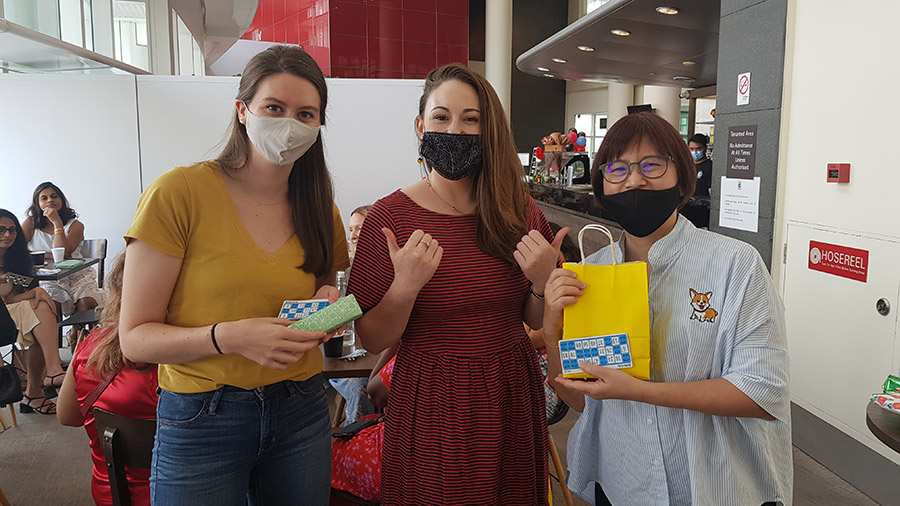
Women’s Care Centre
First response: highlights
- Overall, 6,712 calls, including emails and chats, were supported. Of this total, 66% of calls led to further resources and services provided.
- At the Women’s Helpline, we saw a 40% increase in calls (not including emails and chats) received from 2019 to 2020 (4,343 to 6,092).
- In terms of impact, 78% of callers surveyed felt emotionally supported and better able to understand their options.
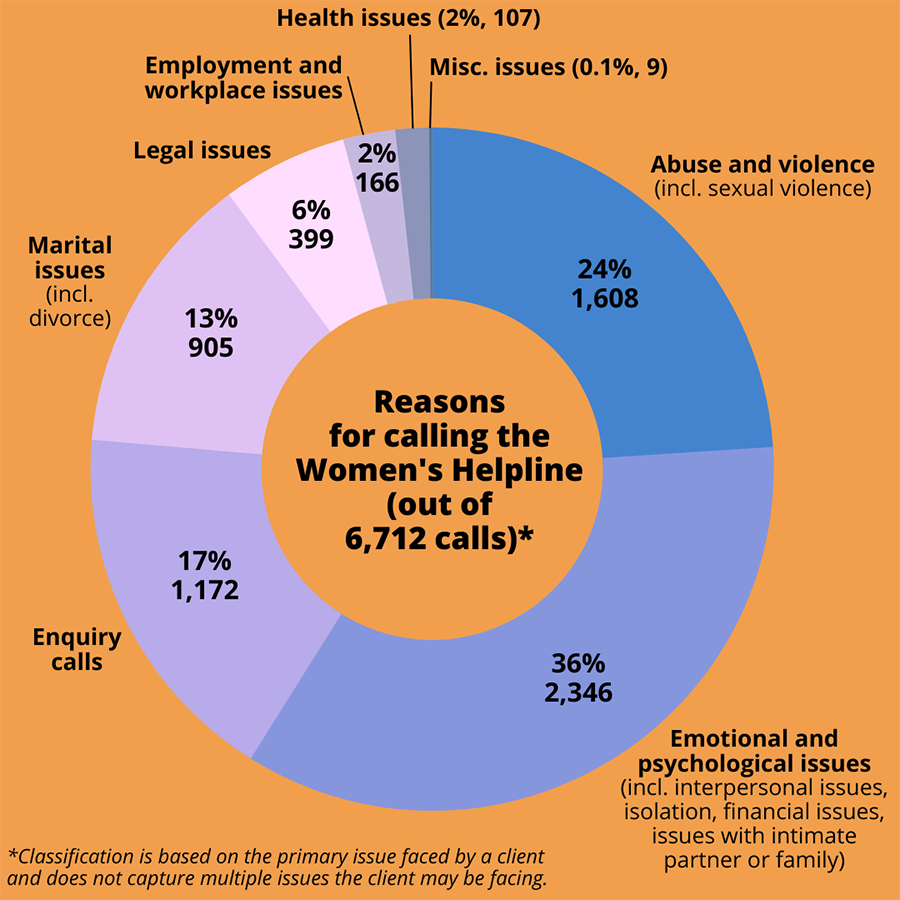
- 79% increase in calls related to abuse and violence (including sexual violence)
- 137% increase in calls related to family violence in May 2019 as compared to May 2020
- 87% increase in calls related to employment issues (job loss, work stress and such)
- 106% increase in calls related to emotional/psychological issues
Direct services: highlights
i) Legal clinic
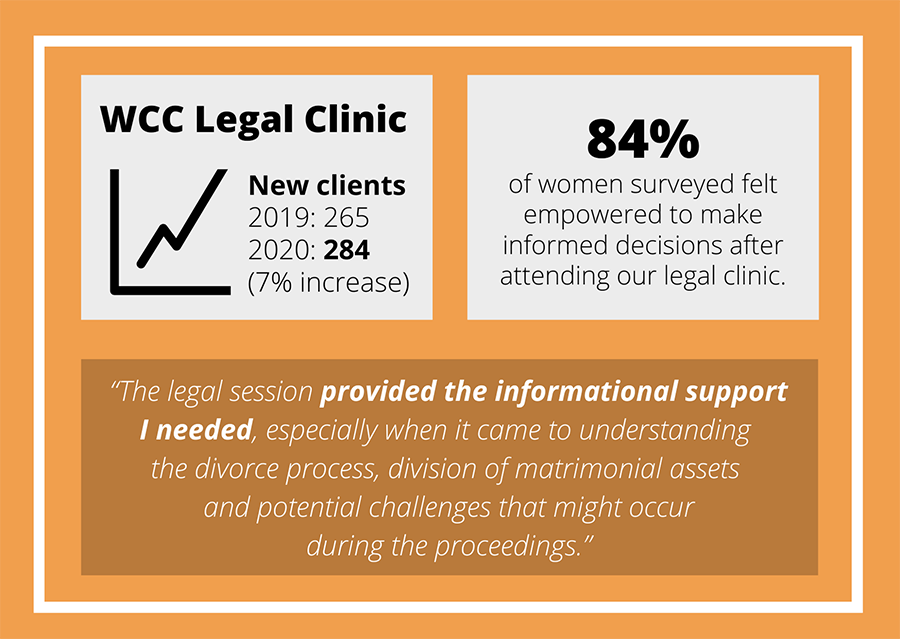
ii) Counselling
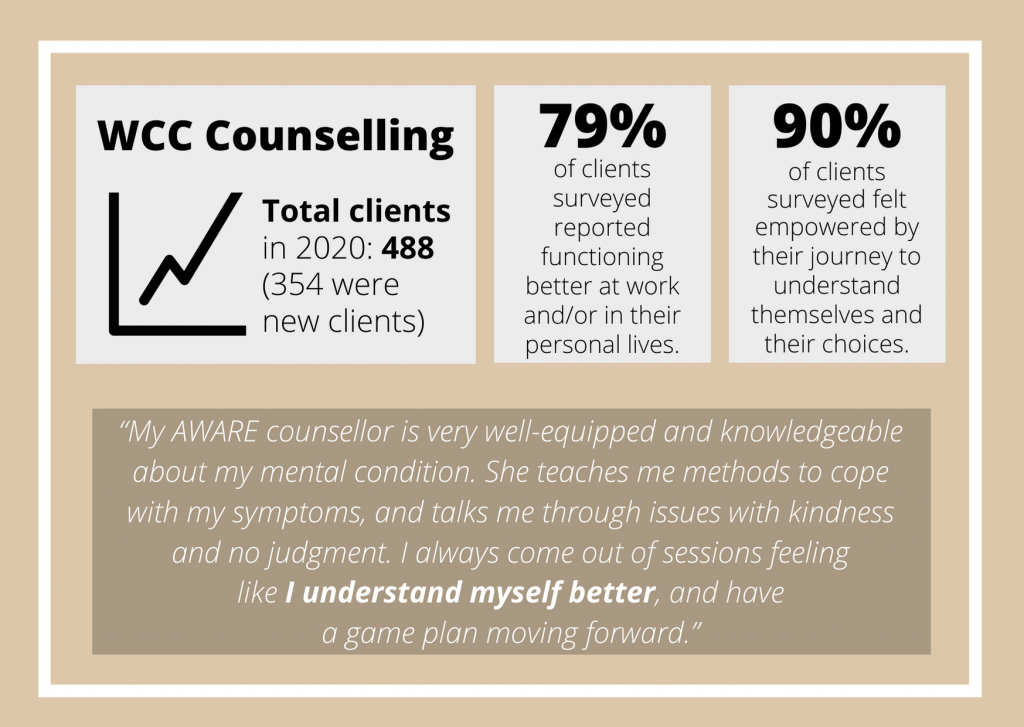
WCC’s counselling service provides non-judgmental, gender-focused support to women through sessions conducted by dedicated and professional counsellors. These sessions are a safe space for women to discuss their issues and learn about their options.
In 2020, we also shifted from our usual face-to-face counselling sessions to providing our services over Skype and Zoom sessions. We efficiently implemented key operational changes to digitise our operations and meet related challenges. This experience pushed us to explore digitising other operational processes for the future, while concurrently sustaining a high client service standard.
iii) Support groups
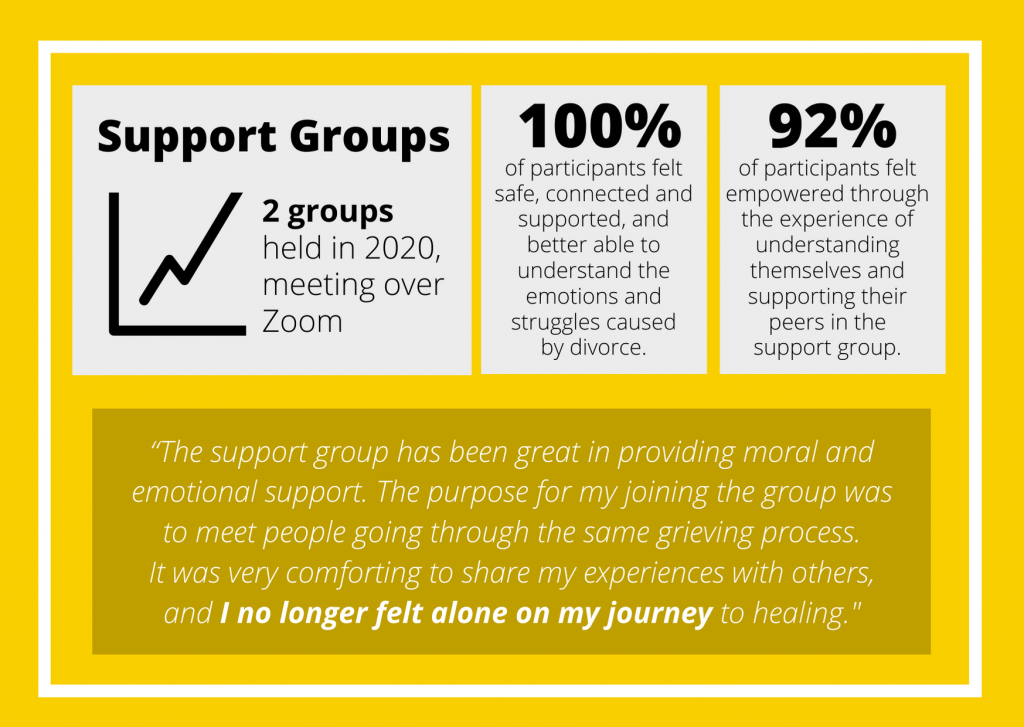
Our support groups foster women’s empowerment through the sharing of similar experiences in a safe and caring environment. In 2020, we held two divorce support groups over Zoom.
Sexual Assault Care Centre
Sexual Assault Care Centre continues to be Singapore’s only dedicated support centre for survivors of sexual assault. We offer gender- and trauma-informed support, and help survivors make informed decisions about next steps, through our first response channels, legal, befriending, counselling and case management services.
During COVID-19, SACC devoted a large amount of time, human resources and funding to ensuring that clients received a similar quality of support remotely as they would have in person. As safety measures changed, we invested in technology, staff, consultancies and volunteers, as well as careful monitoring of programme development. At the same time, demand for our services drastically increased in 2020, forcing our team to make internal processes more efficient.
Our efforts paid off: Despite the constraints, we saw a record of 967 new cases in 2020, a full 24% increase from 777 cases in 2019. The total number of cases supported also crossed 1,000 for the first time in SACC’s history.
Key insights
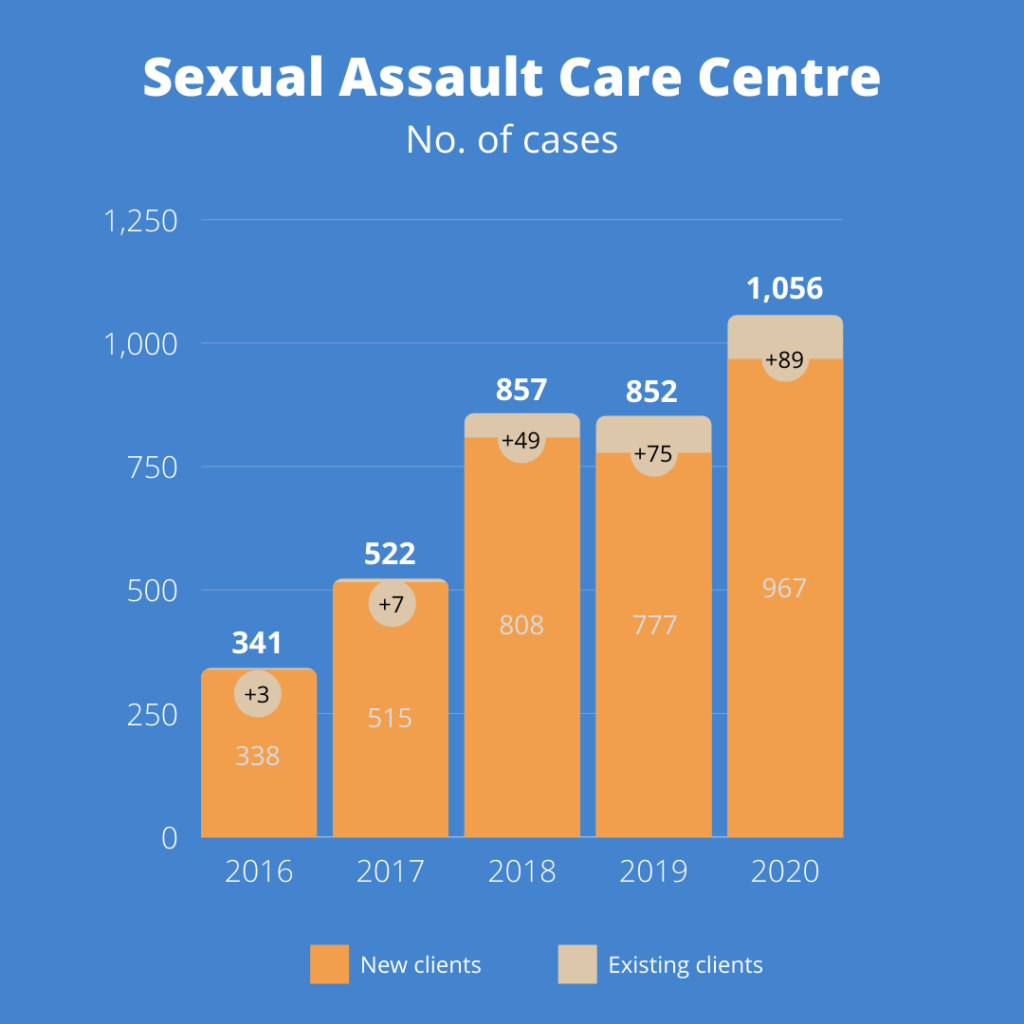
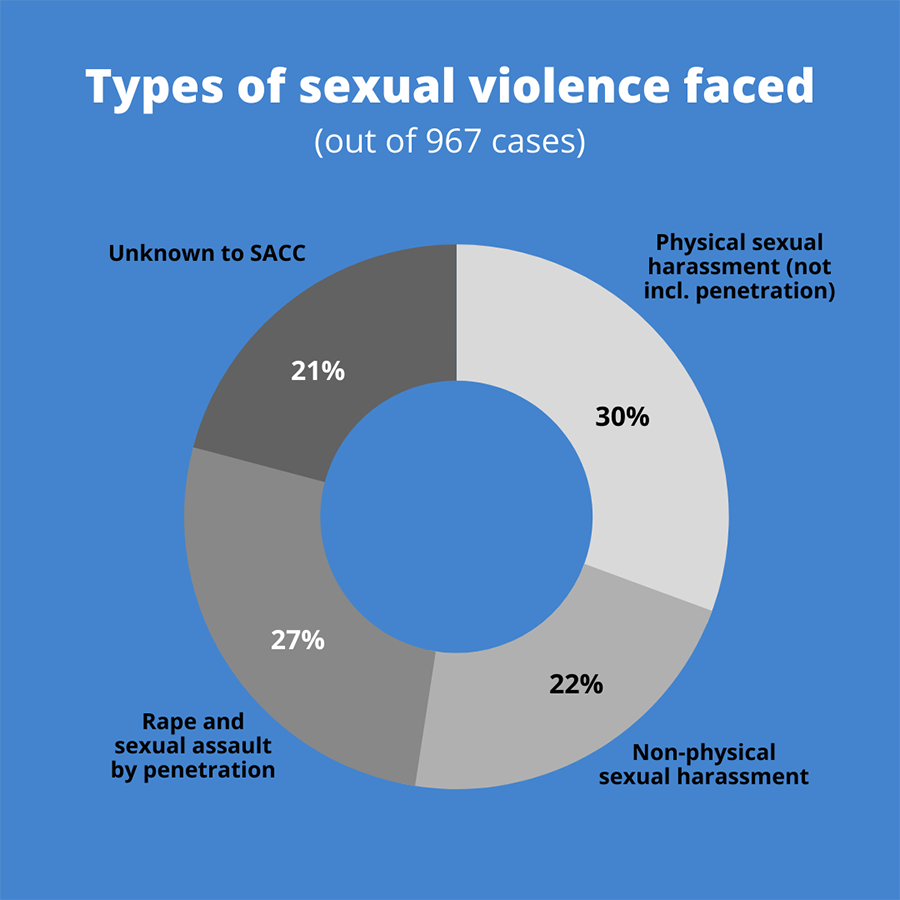
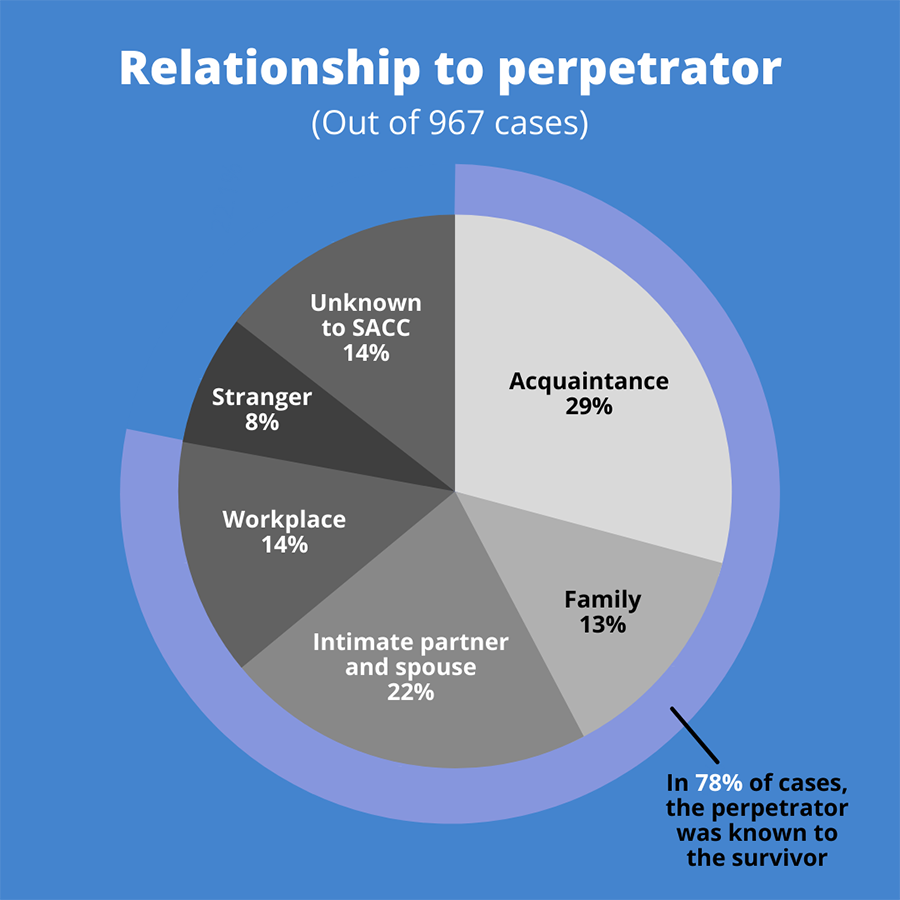
- The proportion of workplace-related cases fell in 2020 (14% compared to 17% in 2019). This might be because of COVID-19 safety measures limiting interactions at the workplace across Singapore. It might also be that due to COVID-related job insecurity, fewer survivors chose to seek support or take action in cases of workplace sexual violence.
- Cases related to intimate partner and spousal assault came in at the highest level ever recorded at SACC. This trend could be correlated to the Criminal Law Reform Act 2019, which criminalised marital rape and came into effect in 2020. This correlates as well with the general increase in domestic violence observed during the pandemic, people tended to have more contact with their spouses or intimate partners as they worked and stayed at home.
- We continued to see a large proportion of clients seeking support for physical forms of sexual assault. It is possible that some survivors only perceive physical assaults to be “serious” enough to warrant support, even though all forms of sexual violence warrant support.
- The period of time between the incident of sexual assault and when the survivor reached out for support continues to vary greatly (from within 72 hours to after 10 years). This is consistent with our understanding that there is no typical time after which a survivor seeks support—they can only do so when they are ready.
* The total number of cases seen by SACC in 2020 was originally published as 1,018. The graph above has been updated to reflect the more accurate total of 1,056.
Impact of SACC
Community and stakeholder engagement
i) Improved access to justice
SACC carried on our case advocacy work to improve survivors’ experiences within the criminal justice system, by working with the Attorney General Chambers, the Serious Sexual Crimes Branch and the Law Society of Singapore (LSS). For the second time, we continued our collaboration with LSS for the event “Balancing Accused’s Rights with Complainant’s Rights in Sexual Assault Trials”. The event was attended by close to 300 defence lawyers, who gave very positive feedback.
ii) Improved access to support

At SACC, we seek to improve sexual assault survivors’ access to support through community engagement in the form of dialogues, training, knowledge-building sessions and a robust network of referrals. We continued these efforts through our two-year Aim For Zero (AFZ) campaign, which promotes zero tolerance towards sexual violence.
We launched a new community engagement initiative under AFZ: the Sexual Assault First Responder Fellowship, which builds the capacity of individuals and helps them venture further into the social services sector. The SACC Fellows took over (from volunteers) the management of the SACC Helpline, WhatsApp service and emails, thereby providing more dedicated, enhanced support to a large number of people in need through our first response channels.
Also under AFZ, our Sexual Assault First Responder Trainings (SAFRT) stayed wildly popular. Despite shifting these trainings online, attendance remained on par with the in-person sessions of previous years (with 400 participants in 2020), and the feedback we received remained positive. Around 96% of participants surveyed indicated that they felt more confident to be first responders to survivors of sexual assault.
At the end of 2020, we also reached out to participants to better understand the impact of the training. Among those surveyed, 40% of them had given support to a sexual assault survivor after the training, and 93% said that the training had helped with that experience. This is a positive step in the right direction—a supportive and non-judgmental first response encourages sexual assault survivors to seek further support, and makes them feel less isolated.
The AFZ team also focused on building ongoing meaningful relationships with key organisations in 2020. We worked with the group Students for a Safer NUS, offering guidance on policy processes and decision-making to make campuses safer for students and sexual assault survivors. Through this engagement, we provided first response training and insights on seeking peer support. Our engagement with groups like SaferNUS was enhanced through collaborations with institutional support channels and university bodies in Singapore, including the NUS Victim Care Unit. This work can help to bring about community- and institutional-level change toward more support for survivors of sexual violence.
Over the course of the two-year AFZ campaign, our social media posts about sexual violence reached nearly 2 million users across our various platforms.